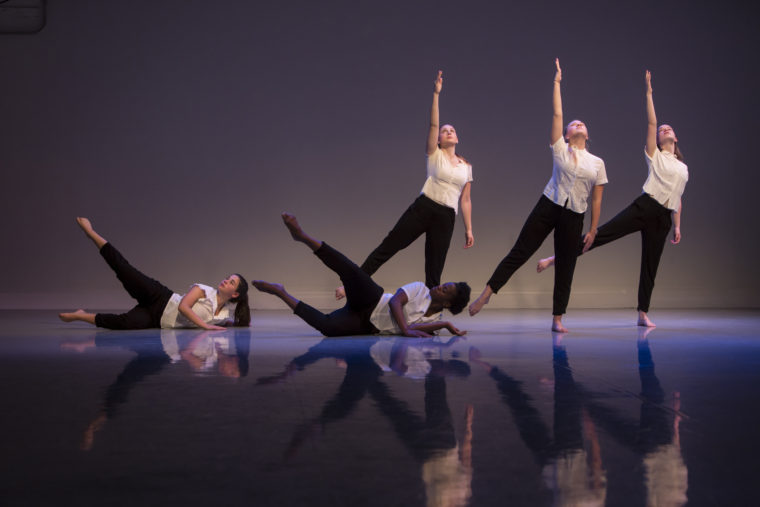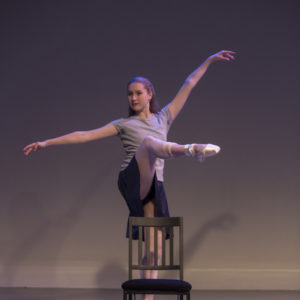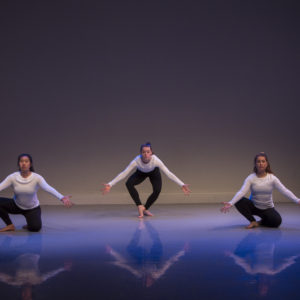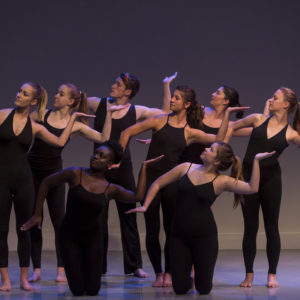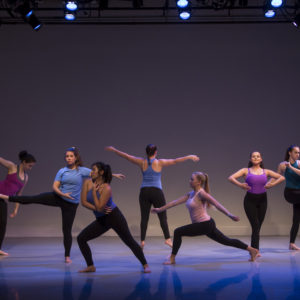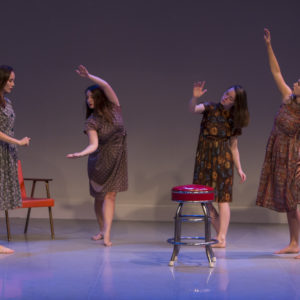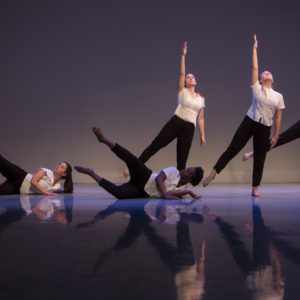The world is hanging upside down. The stage floats like a cloud. The audience perches on the ceiling.
Or perhaps that is only the dancer’s perspective. In “Tribal Dreams,” choreographer Cecil Slaughter presents a vision of a young man discombobulated by social uncertainty. On Dec. 2-4, Slaughter will present this large-scale work for 13 dancers as part of “Critical Mass,” the 2016 concert by Washington University Dance Theatre (WUDT).
“The piece opens with the lead dancer in a headstand,” said Slaughter, professor of the practice in dance and artistic director for WUDT. Dropping to his feet, the dancer begins exploring his surroundings. “He is pulled and tossed in different directions, but he also becomes aware of his own power and his own ability to push back.
“It’s a rite of passage,” Slaughter added. “He realizes that he is strong.”
Critical Mass
Presented annually by the Performing Arts Department (PAD) in Arts & Sciences, WUDT features dozens of dancers, selected by audition, performing new and original choreography by faculty and visiting artists.
Jock Soto, a former principal dancer for the New York City Ballet, will debut “My Soul Remainer,” a new work for six dancers set to music by Soto’s longtime collaborator Laura Ortman. Like Slaughter’s “Tribal Dreams,” the piece centers on a lone figure who is alternately supported and tormented by a larger group.
Nathan Trice, founder and artistic director of nathantrice/RITUALS in New York, will present “Dynamic Inquiry,” a new quartet that explores “society’s need to revisit the basics of connection, co-existence and humanism.”
“Every choreographer has their own vocabulary,” said Slaughter. “But you never really know what you’ll do until you have the dancers in front of you.
“What’s great about WUDT is that pieces are really built around our dancers,” he added. “Sometimes students are more accustomed to a dance that’s like a script. ‘Do these steps in this order.’ So to come to rehearsal and see the piece evolve — to see movements added, changed or subtracted — is a really eye-opening experience.
“It’s not just about moving through the material — it’s about thinking through the material,” Slaughter concluded. “The dance becomes very personal.”
Also on the program are:
“Mashup Moves”
Choreographed by Mary-Jean Cowell
Cowell, associate professor and coordinator of the dance program, collaborates with her dancers to “mash up” movements that evoke different moods. Featuring music by Switched on Bach, Sigur Ros and Dave Brubeck.
“Two, and Only Two”
Choreographed by Christine Knoblauch-O’Neal
“This work grew out of a duet of a dance I created last year for WUDT,” said Knoblauch-O’Neal, professor of the practice in dance. “The duet always felt as if there was something more to investigate, to look into, and so I chose to do just that. The duet has grown into three duets each revealing a part of this pairing, this relationship, and together create, not necessarily a whole, but a journey through the interior of what makes the relationship impossible and what makes it possible.”
“Home Leaving”
Choreographed by David Marchant
“We are perhaps more familiar with the experience of leaving home,” said Marchant, professor of the practice in dance. “But what happens when the home leaves us? This improvised composition explores the dynamic, unpredictable relationships between people we live with, and also the ‘familiar’ bonds we form with the places we live in.”
“Des Poèmes de Prévert”
Choreographed by Dawn Karlovsky
“’Des Poèmes de Prévert’ is inspired by the writings of French poet and screenwriter Jacques Prévert,” said Karlovsy, artistic director of Karlovsky & Company Dance as well as adjunct faculty in the PAD. “These selected poems reflect the hardships, struggles, political influences and anticipated hopefulness of the people of France during the Great Depression of the 1930s.”
Tickets and performances
Performances of “Critical Mass” take place in Edison Theatre at 8 p.m. Friday and Saturday, Dec. 2 and 3, and at 2 p.m. Sunday, Dec. 4.
Tickets are $20, or $15 for seniors, students and Washington University faculty and staff, and $10 for Washington University students. Tickets are available through the Edison Box Office, (314) 935-6543. Edison Theatre is located in the Mallinckrodt Student Center, 6465 Forsyth Blvd.
For more information, call (314) 935-6543 or visit edison.wustl.edu.
